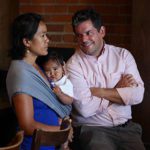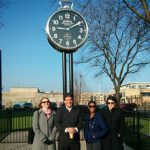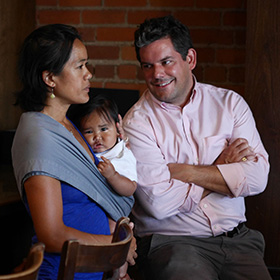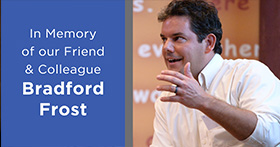On Sunday, January 22, the Capital Impact family lost a dear friend and colleague, Brad Frost. He will be remembered as an individual of integrity, thoughtfulness, sharp wit, and dedication. Brad wore his passion for Detroit on his sleeve and was an unceasing supporter, critic and advocate for the city and all its residents.
A prolific writer, he published many articles reflecting on his experiences living in Detroit and working to improve Detroit residents’ access to opportunity and economic mobility. Model D recently republished this piece, in which Brad reflects on his early days in the city and challenges those living and working here to seize what he called a “once-in-a-generation” opportunity to ensure that Detroit’s growth is inclusive.
My Detroit story started, of course, with a drive. As I rode east down Jefferson and crossed Alter Road—America’s starkest opportunity divide—I knew instantly why I was here.
I had just graduated college, and relocated from the D.C. area on a one-year fellowship. A white kid—with roots from Connecticut of all places—I came to contribute what I could to Detroit’s inclusive revitalization despite knowing little more about the city than tidbits of Americana and a seemingly endless barrage of negative headlines.
I remember vividly the raw sentiments I carried then about ‘Detroit’—how it represented all that was wrong in America with its pervasive crime, blight, and disinvestment.
But as time unfolded, it became very evident to me that it didn’t matter much to Detroiters that I was white. Or an outsider. Or new.
It only mattered that I was here.
That first year revealed an entirely different Detroit narrative. Instead of a barren city of hopelessness, I found a palpable energy and enthusiasm for the Detroit rising story, as 
I was welcomed as part of the solution.
That solution revealed itself in a variety of ways including a book project Bradford led through the Detroit Institute of Arts called Reveal Your Detroit: An Intimate Look at a Great American City. Using disposable cameras, each participant captured people, places, and things that make their lives in Detroit distinctive, inspired by the questions “what does your Detroit look like?” and “how do you want others to see it?”

This approach was part of an inclusive growth strategy – one that is core to our Detroit Program and informs our work nationally as well. That strategy was captured in his seminal report: Towards Inclusive Growth in Detroit: Density & Income Mix Strategies for Detroit’s Mixed-Use Corridors. He further contextualized that report in his blog post with accompanied videos.
Brad was particularly proud of launching the Stay Midtown program in October 2016. Stay Midtown is a pilot initiative of Midtown Detroit, Inc. (MDI) and Capital Impact, with contributions from the Ford and Kresge Foundations, to provide inclusive housing interventions to support Midtown’s critical workforce households at most at risk of market displacement.
This initiative, grounded in a thorough body of research on resident displacement that Brad, Elizabeth Luther and others produced in mid-2016, values inclusive economic development in the district; aims to honor long-term residents of the area; and builds upon the success MDI and its partners have had in deploying similar efforts like the Live Midtown and Live Downtown programs over the last several years.
Brad’s body of work was honored in the book Just Change: How to Collaborate for Lasting Impact published by Living Cities in 2017.

We hope you join us in sending thoughts and prayers to Brad’s wife Dana, family and friends. As Brad himself would remind us, truly celebrating his life means to keep fighting for equity and inclusion in communities everywhere.
Following his diagnosis, Bradford published this deeply personal reflection in the Guardian. It ended with these words:
The truth is, we’re all terminal. I could also get hit by a bus tomorrow. Or I could beat the odds and live till I’m 90. But whatever my time left on this earth, I’ll now endeavor forward with some earned resolve.
I am the person I want to be. I’m not afraid.
At 35, he left this world much too early. But in that short time he made a huge impact that will continue to benefit people in communities for years to come. Our hearts are broken and he will be sorely missed, but his fight lives on in all of us.
It is in that spirt that Brad’s final wish that donations be made to one of the organizations he cared so deeply about – Declare Detroit, the Detroit Riverfront and Live6Detroit.
[dcwsb inline=”true”]








